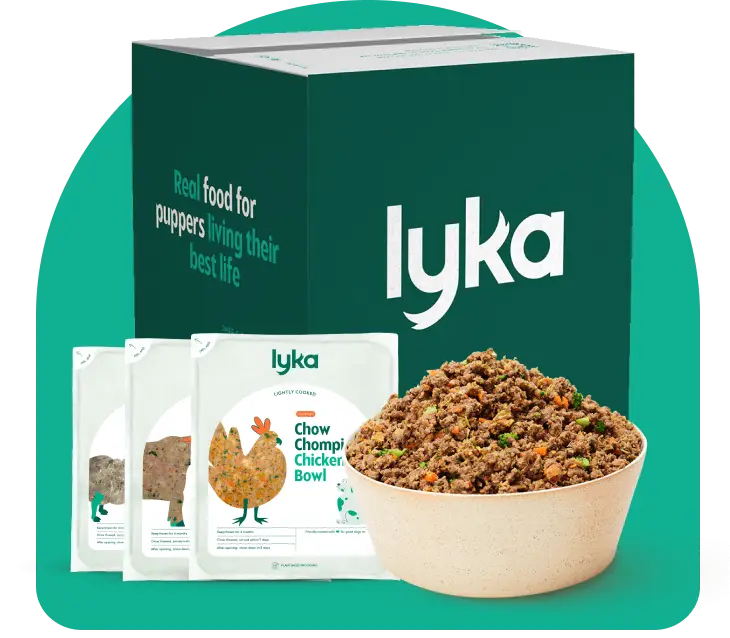The missing link between diet and your dog’s mental health

By Tara Wesson

Food can impact your pup’s state of mind in a number of unseen ways. From irregular mealtimes to an unbalanced ratio of nutrients, nutrition has the potential to affect brain function and mood: for better or worse.
Here’s how to ensure your dog is getting the best balance of essential fatty acids, B vitamins and minerals: for as many tail wags and zoomies as possible.
Common mental health issues linked to diet
Like us, our dogs’ mental state has a direct relation to their food — via the gut-brain axis.
Your dog’s gut microorganisms influence the production and regulation of neurotransmitters like serotonin, dopamine and norepinephrine. The balance of these chemicals is disrupted by inflammation, having an impact on your pup’s mood and behaviour.
Anxiety
Your pup picks up on your energy more than you might think. 70% of all pups exhibit one trait associated with anxiety — while nearly a third of Australians will experience an anxiety condition in their lifetime.
For example: households with an anxious mood can affect your dog’s interest in food, contributing to a perception of threat that may stop them from chowing down.
Here are some other ways anxiety can impact your pup’s eating habits.
Fussy dogs can pick up on the stress of their parents at mealtimes, resulting in a cycle where your pup’s anxiety is amplified by your own feelings of worry about them not eating their meals: which only puts them off further.
If you’re lucky enough to have multiple pups in your life, the feeling of needing to compete for food and resources could be a source of anxiety for your dog.
Change to routine or sensory overload can bring on anxiety in dogs. This includes large noises, new sounds or smells, new family members and other pets, lawnmowers and traffic.
Lyka’s Calm Pupper Supplement is a daily dose of stress relief, with a mix of superfoods to soothe the mind and body. Decaffeinated green tea extract and probiotic BL-999 support balanced behaviour, whether your pup experiences separation anxiety, whining or barking, or soiling or marking indoors.
Depression
Depression can come from boredom and lack of enrichment in your dog’s life, but it can also happen after the loss of another dog or family member. If your pup seems a little low in spirits, their diet could also hold some valuable clues:
Certain preservatives in pet food can trigger depression in dogs. Propionate (a food preservative found in some commercial dog foods) has been shown to damage the dopamine system in the brain.
High GI foods (such as diets high in carbohydrates) can cause blood sugar spikes followed by crashes, leading to depressive behaviour and mood swings.
Obesity can play a role in depression, which is why it’s important to control portion sizes to manage weight and limit overfeeding.
Using slow feeders for cognitive stimulation, or a long-lasting chew for stress relief as biting and chewing releases endorphins.
Aggression, hyperactivity or difficulty training
We love a boisterous pup as much as anyone, but when does reactivity become a problem? If your dog is biting, antisocial around other dogs or defensive around food, it could be worth considering whether your dog’s mood is linked to a nutritional imbalance.
Here’s what to consider about diet’s role in irritability, aggression, and overstimulation for your pup:
Processed food like kibble has higher amounts of omega-6 fatty acids, which promotes inflammation in the body and brain. More inflammation can mean more aggressive behaviour.
Artificial additives and chemicals could be responsible for hyperactivity for your pup.
High carbohydrate diets can cause rapid blood sugar spikes and crashes. This can lead to mood swings, aggression and hyperactivity for your best friend.
Give your pup a good mood with good food
Protein is essential for dogs, but too much protein — especially from poor-quality sources — can lead to overstimulation and increased arousal. This is why human-grade protein is best, whether it’s wild-caught fish or barn-raised turkey. Both sardines and turkey are high in an amino acid called tryptophan, which has relaxing effects and can assist with mood regulation.
Other fresh ingredients to benefit your pup’s mental health include:
Mushrooms contain beta-glucan to help improve your dog’s microbiome and metabolism, having knock-on effects for their mood.
Spinach is rich in tryptophan to increase serotonin, as well as folate which produces dopamine — the good mood hormone.
Turmeric for its active ingredient, curcumin: which acts as a mood stabiliser.
We all want to make the healthiest choices for ourselves and our families. Our dogs trust us to make these important decisions for them, with their best interests in mind.





